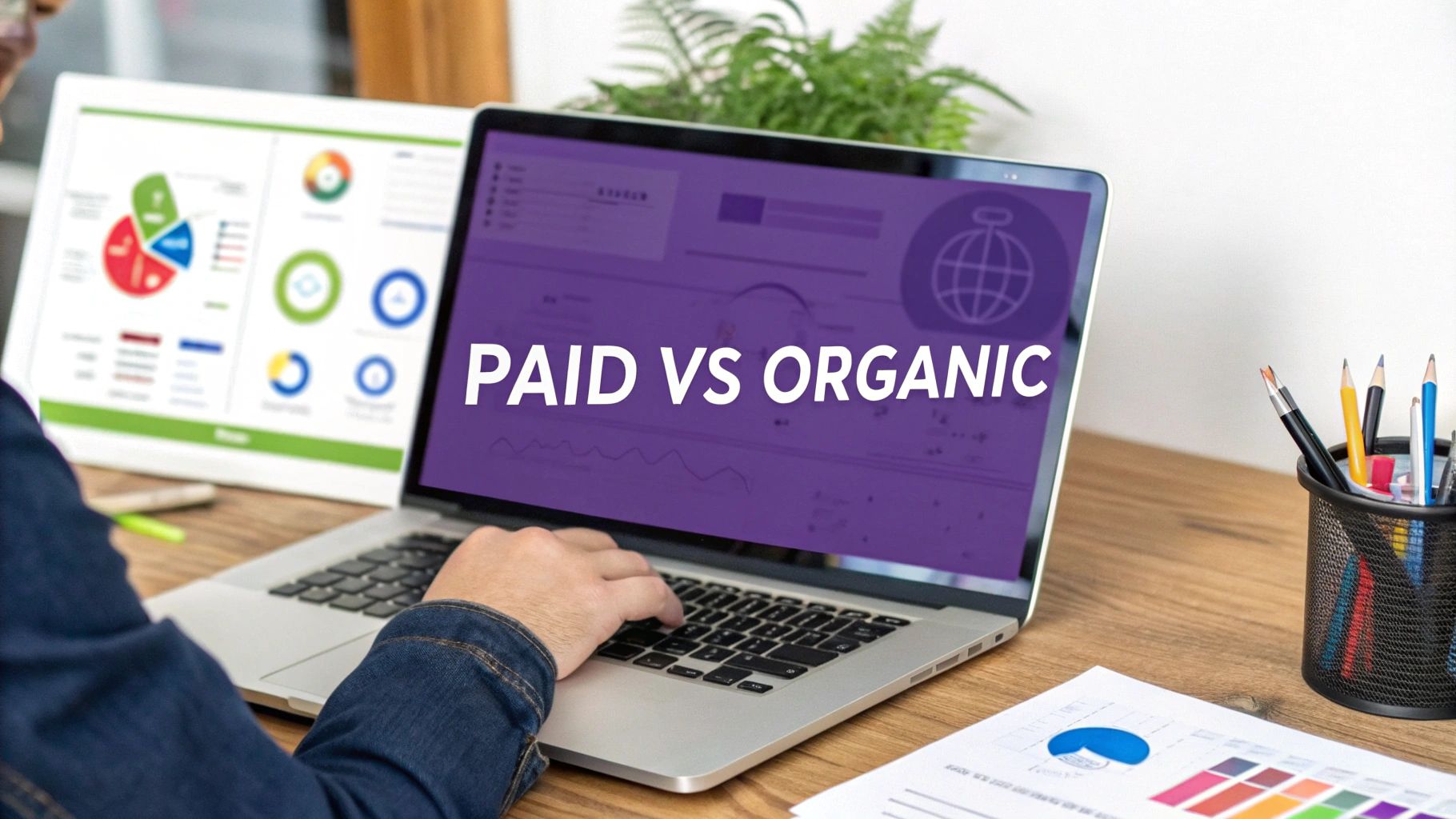Paid vs Organic Search A Marketer's Guide
At the heart of it, the difference between paid and organic search is pretty straightforward: paid search is about buying your way to the top, while organic search is about earning your spot for free. Paid search gets you instant visibility (for a price), while organic search is the long game—building a traffic-generating asset that lasts.
Unpacking Paid and Organic Search Strategies
To really get what makes these two channels tick, you have to look under the hood. Both are trying to grab the attention of people using search engines, sure, but they work on completely different principles. We're talking cost, speed, and even the level of trust they build with an audience. A great starting point is understanding organic traffic and its significance before diving deeper.
This chart breaks down the big-picture differences in performance—how much they cost, who clicks what, and how long it takes to see real results.
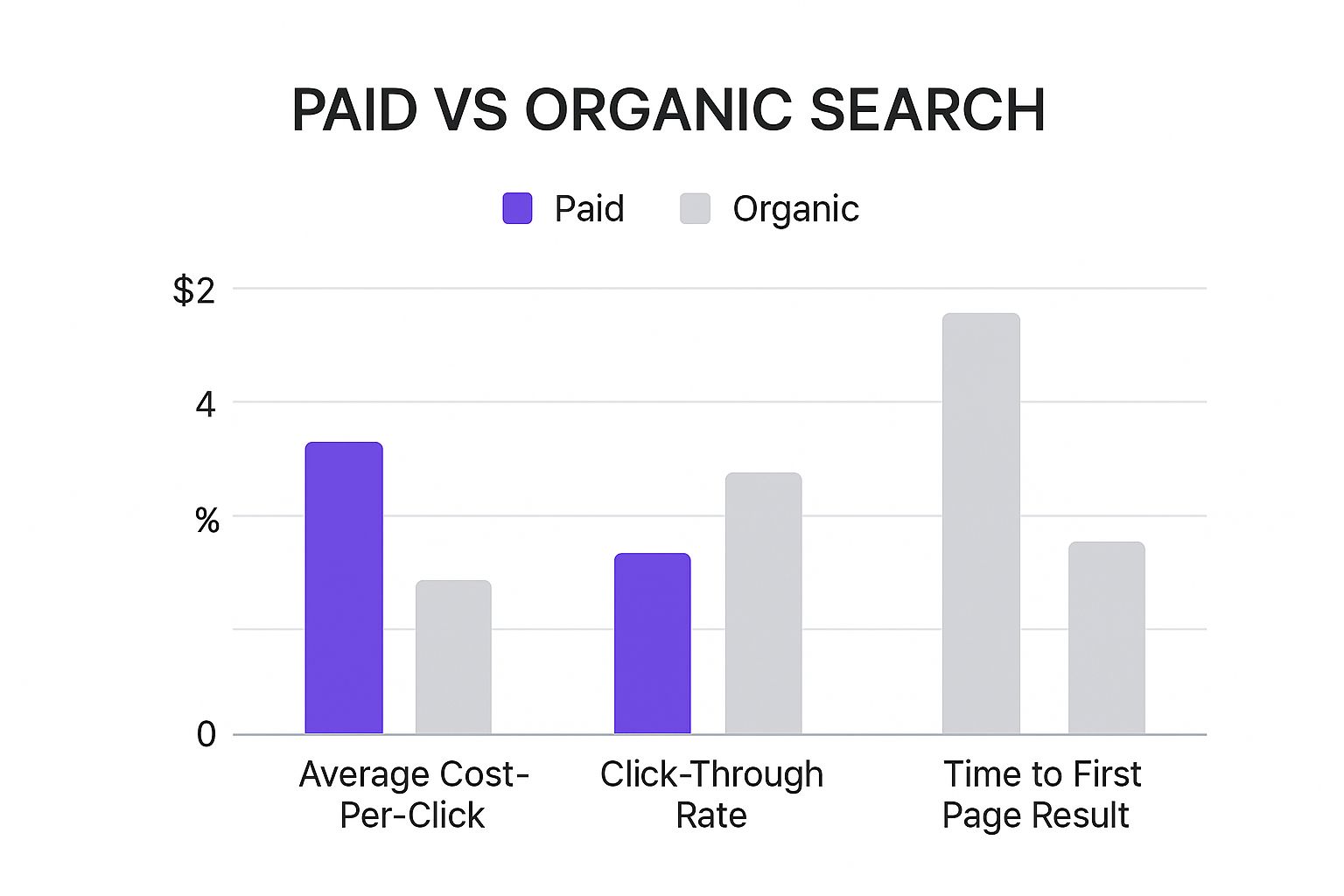
The numbers don't lie. While paid search can land you on the first page almost immediately, it comes with a direct cost for every click and usually pulls in a lower click-through rate than a top-ranking organic result.
What Is Organic Search?
Organic search is what most people mean when they talk about SEO (Search Engine Optimization). It’s the art and science of tweaking your website to show up higher in the unpaid search results. The whole point is to rank high because your content is genuinely relevant, your site is technically sound, and you've built up enough authority over time.
Think of it like earning your reputation. When someone searches, Google’s brainy algorithms scan the web to find the most helpful, trustworthy answer. A solid organic strategy is all about convincing Google that your website is that answer.
Organic search is a marathon, not a sprint. You won’t see results overnight, but the traffic you build is sustainable, highly trusted by users, and doesn’t vanish the second you turn off your ad budget.
What Is Paid Search?
Paid search, often called PPC (Pay-Per-Click), is exactly what it sounds like. Businesses pay a fee every single time someone clicks on one of their ads. You've seen them—they're the results at the very top or bottom of the page with a little "Ad" or "Sponsored" tag next to them. If you want to get into the nitty-gritty, our guide to https://rebusadvertising.com/paid-search/ is the perfect place to start.
This approach lets you jump the line. You can bid on keywords your ideal customers are searching for and get your message in front of them right away. It's a direct, fast way to buy traffic and see if an offer has legs.
Quick Comparison: Paid vs. Organic Search
To make things even clearer, here’s a quick side-by-side look at how paid and organic search stack up against each other.
| Cost | Pay-per-click (direct cost for every visit) | No direct cost per click (investment in resources) |
|---|---|---|
| Speed to Results | Immediate (ads appear within hours) | Slow (can take months or even years to rank) |
| Sustainability | Traffic stops when you stop paying | Traffic is long-lasting and can grow over time |
| User Trust | Lower; users recognize it as advertising | Higher; results are seen as more credible and authoritative |
| Click-Through Rate | Generally lower than top organic results | Significantly higher for top-ranking positions |
As you can see, there’s a clear trade-off. Paid search delivers speed and control, while organic search offers sustainability and trust. Neither is universally "better"—the right choice depends entirely on your goals, your timeline, and your budget.
Comparing Performance and Return on Investment
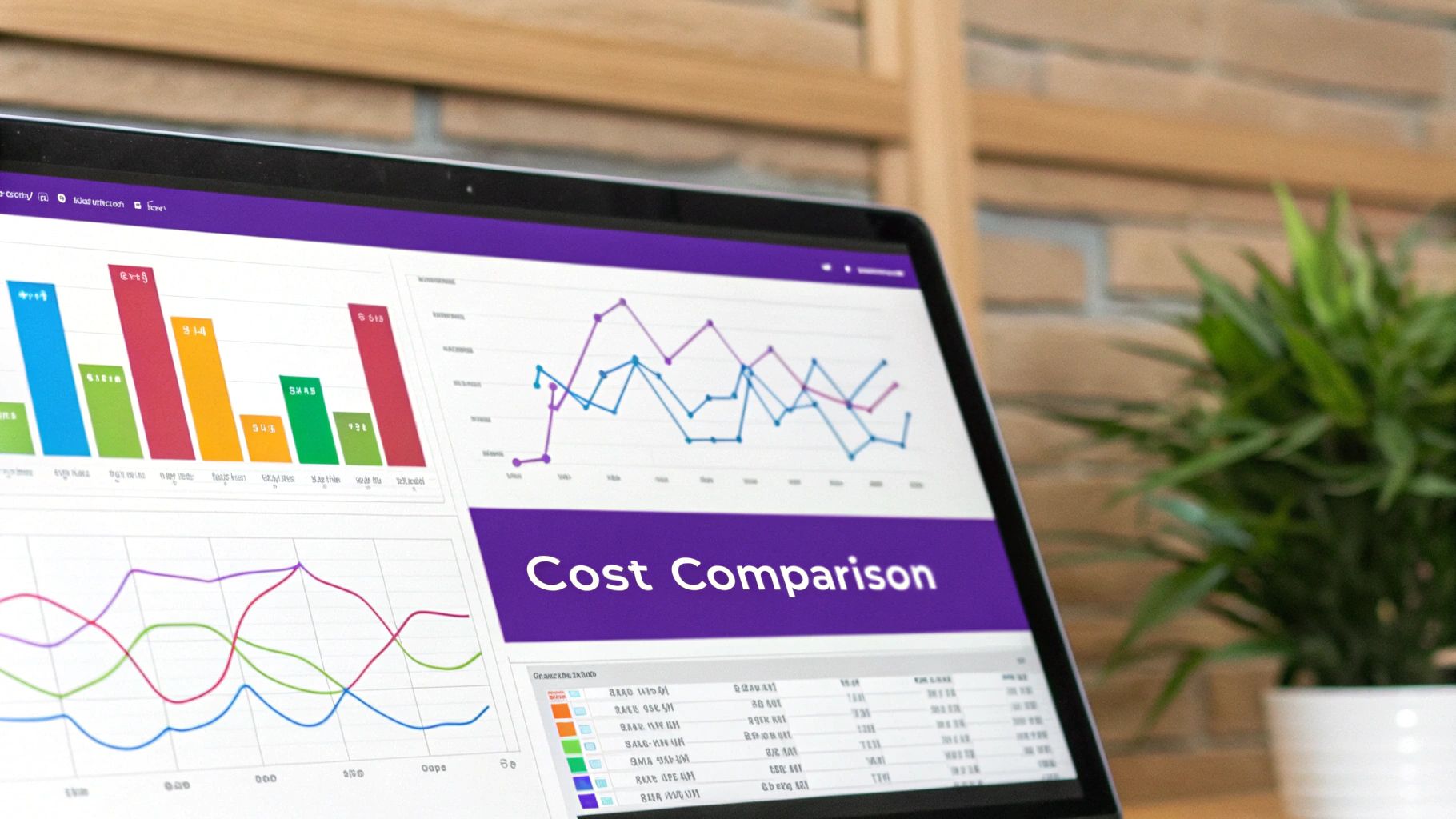
When you get down to brass tacks, the whole paid vs. organic debate always lands on one thing: money. Specifically, performance and return on investment (ROI). Both channels are designed to bring people to your digital doorstep, but they deliver value on completely different timelines with totally different economic models. Getting this right is the key to not blowing your marketing budget.
Paid search is the gas pedal. You can fire up a campaign and see traffic, leads, and sales flooding in literally within hours. It’s a lifesaver for businesses that need a quick win, want to test a new offer, or need to jump on a short-term trend. The performance is brutally simple: the more you spend, the more visibility you buy.
Organic search, on the other hand, is the slow-cooked brisket. It demands a serious upfront commitment to creating great content, nailing technical SEO, and building authority, often with zero visible return for the first few months. But once you get that momentum, you’ve built a sustainable, compounding asset that drives traffic without costing you a dime per click.
Dissecting the Financial Models
The core financial difference is in how you pay for eyeballs. Paid search runs on a pay-per-click (PPC) model, meaning every single visitor comes with a direct, trackable price tag. This gives you predictable cost-per-acquisition (CPA) numbers, but it also means the second you turn off the money tap, your traffic dries up. Poof. Gone.
Organic search is an investment in resources—your time, your team's expertise, and the content you create—not a direct ad spend. The initial costs can feel steep, but what you're really doing is building a digital asset. A single well-crafted blog post can rank for years, pulling in free traffic and leads long after you've forgotten you even wrote it. This flips the ROI conversation from immediate returns to long-term value.
The crucial distinction is that with PPC, you are renting traffic. With SEO, you are building an asset that owns traffic. This fundamental difference shapes the entire ROI conversation.
For a deeper look at how these approaches hit your bottom line, check out our article exploring https://rebusadvertising.com/blogs/paid-search-vs-seo/ for more insights.
Audience Targeting and User Intent
Another huge performance factor is how each channel lets you zero in on your audience. Paid search gives you ridiculously granular control. You can target users based on specific demographics, where they live, what device they’re on, and even their past browsing habits through remarketing. This kind of precision is perfect for reaching a clearly defined audience with a high-intent, "buy now" offer.
Organic search, by contrast, casts a much wider net across the entire customer journey. It’s brilliant at attracting people from the moment they realize they have a problem ("what is the best software for accounting?") all the way to when they're ready to swipe a card ("acme accounting software reviews"). By creating content that actually helps people, SEO builds trust and positions your brand as the go-to authority.
This difference in trust has a real, measurable impact. The numbers don't lie: organic search is a beast, driving a massive 53.3% of all web traffic. People clearly prefer earned rankings, with around 70% of clicks going to organic results over paid ads. More importantly, that trust pays off—organic search boasts an impressive 14.6% average conversion rate, leaving most paid channels in the dust.
Long-Term Value and Compounding Returns
The true ROI of organic search is often missed because its benefits aren't linear. The value compounds, like interest in a savings account.
- Sustainable Traffic: Once you snag a top ranking, you can often hold onto it with just occasional updates, generating a steady stream of traffic without any ongoing ad spend.
- Brand Authority: High organic rankings are a signal to both users and search engines that you’re a credible, authoritative voice in your space.
- Asset Creation: Every piece of content you produce becomes a digital asset. It can attract links, be chopped up for social media, and support all your other marketing efforts.
Paid search might not be a compounding asset, but it provides priceless data that can turbocharge your entire marketing strategy. It lets you rapidly test keywords, ad copy, and landing pages, then feed those winning insights right back into your organic game. To dig deeper into how different lead sources affect your business, explore the real ROI story of inbound vs. outbound leads.
Ultimately, the goal isn’t to pick one over the other. It’s to understand how their unique strengths can work together for maximum impact.
Analyzing User Behavior and Click-Through Rates
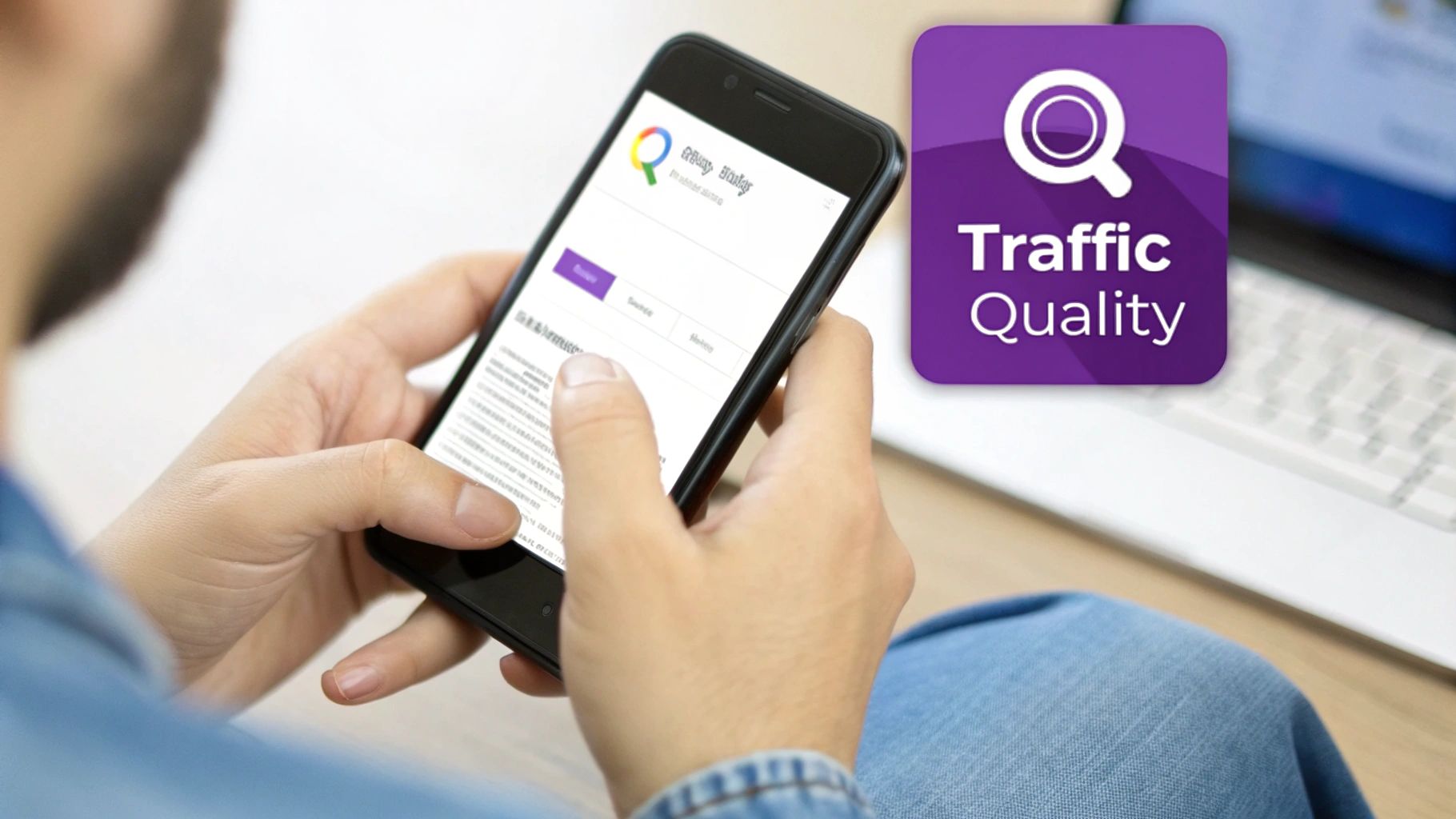
Knowing the technical difference between paid and organic is one thing. Understanding the split-second human psychology behind a click is a whole other ballgame. When someone lands on a search results page, they’re making instant judgments that decide where their mouse goes—and the data shows a massive preference for one over the other.
This isn’t random. It’s all about trust. Users instinctively know that organic results earned their spot. They’re there because Google’s beast of an algorithm decided they were the most credible, relevant answers. That creates a powerful perception of merit that you just can't buy.
Paid ads, on the other hand, wear their label on their sleeve. Even when they're perfectly targeted, they're still ads. Seasoned searchers have developed a serious case of “ad blindness,” where their eyes just glide right over the sponsored fluff to get to the "real" results.
The Unbeatable Power of Earned Trust
The trust people put in organic rankings has a direct, measurable impact on who gets the click. An organic result feels like an endorsement from the search engine itself, a signal that the content is top-notch, authoritative, and genuinely useful.
Think of it this way: you’re looking for the best tacos in town. Would you trust a paid ad in a tourist magazine or a glowing review from a local food blogger who lives and breathes tacos? The blogger’s recommendation carries more weight because it was earned. That’s exactly how users see the paid vs organic search dynamic.
Paid search can buy you a spot at the top of the page, no question. But organic search wins the war for attention and trust. An ad gets you in front of people; a top organic ranking convinces them you deserve to be there.
This isn't just a theory—the numbers are staggering. The top organic positions don't just get a few more clicks. They completely dominate the page.
A Head-to-Head Look at Click-Through Rates
The way clicks are distributed on a search results page isn't a gentle slope; it's a cliff. The #1 organic position is arguably the most valuable piece of real estate on the internet, gobbling up a massive share of clicks compared to everything else on the page, paid ads included.
Just how dominant is it? An in-depth analysis of Google click-through rates shows that the top organic result pulls in, on average, 19 times more clicks than the top paid search ad. It gets even wilder: the first three organic results capture a colossal 68.7% of all clicks. That #1 spot alone gets more clicks than positions #3 through #10 combined. You can discover more about how rankings impact clicks in the full analysis.
Here’s a quick breakdown of what that looks like in the wild:
| Top Paid Ad | Low (often 2-5%) | "It's an ad. I see it, but I'll probably skip it." |
|---|---|---|
| #1 Organic Result | Very High (often 25-30%+) | "This is it. The most legit, trustworthy answer." |
| #2-#5 Organic Results | Moderate (5-15%) | "Still very credible. These are my next best options." |
This data is a game-changer for marketers. While paid search offers that instant gratification of guaranteed placement, it’s often not capturing the user’s primary attention or trust. To build a killer strategy, you have to balance the quick wins from paid ads with the long-term, high-value engagement that only a powerful organic presence can deliver.
Strategic Scenarios for Prioritizing Paid Search
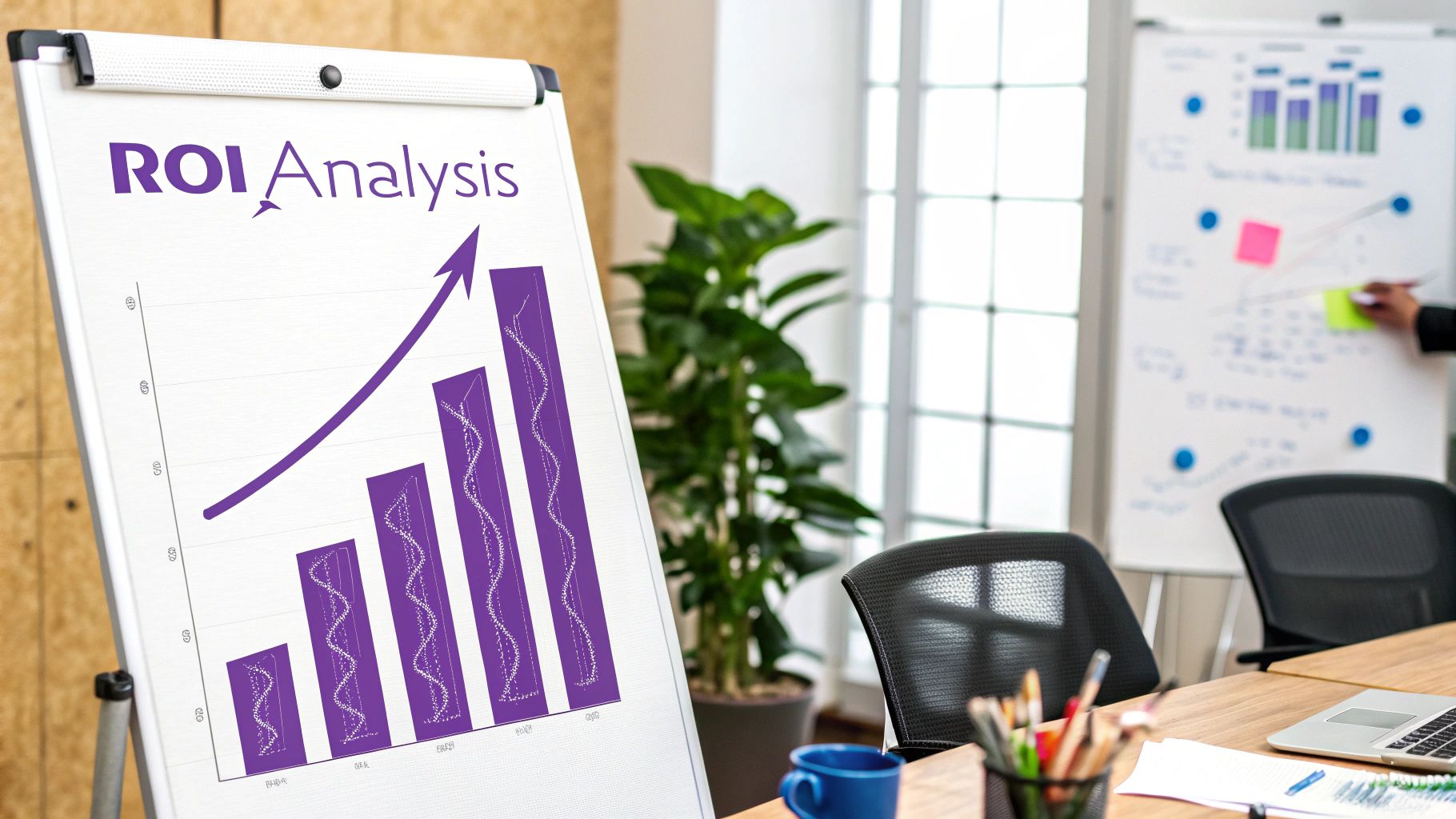
Look, organic search is the long game. It's how you build a rock-solid foundation of authority. But some business moments demand speed, precision, and absolute control. This is where paid search stops being a shortcut and becomes your most powerful tactical weapon.
Knowing when to deploy a paid strategy is what separates good marketers from great ones. It’s for those time-sensitive opportunities where waiting for SEO to kick in just isn’t an option.
Accelerating Market Entry and Validation
Launching a new product or service is a race against the clock. You need to know if your messaging lands, if the price is right, and if anyone actually cares—and you need to know yesterday. Waiting six months for organic rankings to mature is a death sentence.
Paid search campaigns put your brand in front of high-intent buyers on day one. You can funnel targeted traffic to a brand-new landing page instantly, gathering real-world conversion data in days, not months. It's the ultimate market viability test.
Paid search acts as a market research accelerator. It provides immediate, real-world data on what messages convert, allowing you to refine your strategy before committing to the resource-intensive process of building organic authority.
Before you sink a massive budget into a long-term content plan, a small PPC spend can validate your entire approach. This data-driven feedback loop minimizes risk and ensures your bigger marketing bets are built on a proven foundation.
Dominating High-Stakes Moments
Some situations just demand immediate, top-of-page visibility. These are the make-or-break moments where being number one, even for a short time, can have a massive impact on your bottom line.
Here’s when paid search is the clear winner:
- Time-Sensitive Promotions: Got a Black Friday sale or a limited-time webinar? Paid ads can be switched on and off like a light switch, perfectly aligning with your promotional calendar for a surge of traffic exactly when you need it.
- Targeting High-Commercial-Intent Keywords: Think about terms like "emergency hvac repair" or "buy protein powder online." The user is ready to pull out their credit card right now. Competition is savage, and paid ads guarantee you’re in front of those motivated buyers.
- Brand Defense: It’s a dirty game, but competitors will bid on your brand name to steal your traffic. Running your own branded campaign is a cheap, effective insurance policy to protect your turf and make sure your customers find you.
So, when does it make the most sense to go all-in on a paid search campaign? It really comes down to your immediate business goals. I've seen it work wonders in a handful of key situations.
Strategic Scenarios for Paid Search
| New Product or Service Launch | Immediate market feedback and initial sales | You can't wait for SEO. Paid ads drive instant traffic to test messaging, pricing, and demand. |
|---|---|---|
| Time-Sensitive Promotions | Maximize visibility during a specific window (e.g., flash sale) | Paid ads offer precise control over timing. You can turn them on and off to match your promotional calendar perfectly. |
| High-Competition Keywords | Capture ready-to-buy customers for valuable terms | For hyper-competitive keywords, outranking established organic players is tough. Paid search buys you a top spot. |
| Lead Generation for a New Offer | Quickly fill the top of the funnel | Need to validate a new lead magnet or eBook? A small PPC budget can generate leads fast and prove the concept. |
| Defending Brand Name | Protect your traffic from competitors bidding on your brand | It’s a defensive move. A low-cost branded campaign ensures users searching for you find you, not a competitor. |
Ultimately, this isn't about choosing one channel over the other forever. It's about understanding the unique strengths of each.
Paid search shines when you need to control the message, timing, and audience with surgical precision. It gives you an agility that’s absolutely essential for capturing those fleeting opportunities and protecting your brand in a dog-eat-dog world.
When to Build Your Strategy Around Organic Search
Paid search gets you in the game today, but organic search is how you build a legacy. It's the long play—the strategic choice for businesses that want to cultivate real growth, become the undisputed authority in their space, and build a traffic engine that runs on its own fuel, not your daily ad budget.
Think of it this way: prioritizing organic search is like planting an orchard instead of buying fruit at the store. A paid ad disappears the second you stop feeding it money. A top-ranking blog post or service page? That can keep bringing in traffic and leads for years, compounding its value over time. This is the bedrock for any brand serious about educating its audience and earning their trust.
Become the Undisputed Authority in Your Niche
In the cage match of paid vs. organic search, organic is the hands-down champion of credibility. When your website consistently shows up in the top unpaid results, it sends a clear signal to your audience: you’re a legitimate, trustworthy expert. This isn’t just a feeling; it’s a powerful psychological trigger that drives clicks and conversions.
This earned authority becomes your competitive moat. As you publish more high-quality, genuinely helpful content, search engines start seeing your entire website as a go-to resource. This makes it easier to rank for new keywords down the road, creating a powerful growth loop that competitors can’t just buy their way into.
An organic search strategy isn’t about chasing clicks; it’s about building a reputation. Each piece of content is a digital handshake, introducing your brand as a helpful guide instead of just another advertiser yelling for attention.
Create a Traffic Source That Lasts and Scales
The economics of organic search are what make it so powerful. Your primary investment is in resources—time, expertise, and content creation—not a direct cost-per-click. It demands patience, but the payoff is a traffic source that’s both sustainable and massively scalable.
An organic-first approach is a no-brainer in these scenarios:
- You're Building a Content Hub: If you're in a complex field like finance, healthcare, or B2B tech, your customers need education. A killer blog or resource center built on solid SEO principles will pull in users at every stage of their journey, from “I think I have a problem” to “I’m ready to buy.”
- Your Goal Is Long-Term Lead Gen: Got a long sales cycle? Organic content is your best friend. It consistently fills the top of your funnel with qualified prospects who are actively looking for answers, giving your sales team a steady stream of warm leads to nurture.
- You're Competing on a Lean Budget: For startups and small businesses, trying to outspend giants on paid ads is a losing battle. Organic search completely levels the playing field. It allows you to outsmart—not outspend—your competition by creating better, more helpful content that people actually want.
A well-oiled organic strategy turns your website into an asset that works for you 24/7. To learn more about laying this groundwork, check out our deep dive on SEO services and strategies. Choosing organic isn't just a marketing tactic; it's a commitment to building real value, earning genuine trust, and making sure your brand’s growth is built to last.
Weaving Paid and Organic into One Killer Strategy
The sharpest marketers I know have stopped asking, “Paid or organic?” They’re asking, “How do we make them work together?” Treating these channels like they’re in separate rooms is leaving a huge pile of money on the table. When you get them talking to each other, you create a powerful feedback loop where each one makes the other stronger.
The goal? Total, undeniable dominance on the search results page.
This hybrid model treats search as one big ecosystem. Instead of fighting over budget, your paid and organic teams are swapping data, sharing insights, and building a strategy that’s way more powerful than the sum of its parts.
Fueling Your SEO Engine with PPC Data
Think of paid search as a crystal ball for your long-term organic strategy. PPC campaigns spit out data almost instantly, letting you make smart, fast decisions for your SEO efforts—which, let's be real, can take months to show any real movement.
This synergy completely de-risks your content investment. Forget guessing which keywords might lead to conversions. You can use real-world PPC performance data to pinpoint your money-making terms and shove them to the top of your SEO content calendar.
Here's how you put this into play:
- Find Your High-Converting Keywords: Dig into your Google Ads account and pull out the keywords with awesome click-through rates (CTR) and conversion rates. These are your proven winners. Go build dedicated organic content around them. Now.
- Test-Drive Headlines with Ad Copy: Run A/B tests on different headlines and descriptions in your paid ads. The copy that gets the most clicks is a fantastic candidate for your page's meta title and description, which can give your organic CTR a serious boost.
- Uncover Hidden Content Ideas: Get cozy with the "Search Terms" report in Google Ads. This shows you the actual phrases people are typing into the search bar. You’ll often strike gold, finding long-tail keywords and user questions you can build entire blog posts around.
The heart of a hybrid strategy is simple: use the speed of paid search to prove an idea works, then use the staying power of organic search to build a long-term, cost-effective asset around that proven concept.
Achieving Total SERP Domination
A truly integrated strategy aims for complete control over the search results for your most valuable keywords. This means snagging the top paid ad spot and the #1 organic position at the same time. This kind of "brand omnipresence" builds a massive amount of trust and dramatically increases your total clicks.
While organic results are highly trusted, showing up twice reinforces your authority like nothing else. Organic search is still the main event when it comes to clicks—the top organic result can pull in a CTR around 27.6%. The global average CTR for paid ads, by comparison, is much lower at about 1.63%. But with marketers projected to jack up their paid search spending by 72.3% by 2030, the value of playing both sides is undeniable. You can dive deeper into how paid and organic strategies deliver killer returns when used in tandem.
Here’s another powerful tactic: use remarketing ads to bring back people who first found you through an organic search. If someone lands on a blog post but bounces without converting, you can serve them targeted ads across the web, nudging them to come back and finish what they started. It’s the perfect way to bridge the gap between initial interest and a final conversion, squeezing every drop of value out of your organic traffic.
A Few Lingering Questions
Even when the paid vs. organic search dynamic makes sense on paper, a few key questions always pop up when it's time to build a real-world strategy. Let's tackle them head-on, because getting these answers right is crucial for spending your money and time wisely.
The big one is always about the budget. How do you split it? There’s no magic formula, but a good place to start is by looking at what you need right now versus what you want to build for the long haul. If you need leads in the door tomorrow to prove a new service concept, you’re going to lean heavily on paid search at the beginning.
On the other hand, if you're building a brand in a niche where the sales cycle is long and educational—think complex software or high-end consulting—then putting more of your resources into foundational SEO content is the smarter play. It’s all about finding that sweet spot that gets you some quick wins without gutting your long-term, sustainable growth.
How Long Until I See Results?
This is where the two channels couldn't be more different. With paid search, results are pretty much instant. You can launch a campaign in the morning and see traffic, leads, or sales coming in by the afternoon. It's perfect for testing offers and getting immediate feedback.
Organic search, though? That’s a marathon, not a sprint. You're typically looking at three to six months before you start seeing real, meaningful movement in search rankings, especially for new content. In a really competitive space, it might take even longer. SEO is all about building an asset that grows over time, and that just takes patience and consistent effort.
Think of it like this: Paid search is renting. You get a great place with immediate access, but the minute you stop paying rent, you're out. Organic search is like buying a house. It’s a huge upfront investment of time and effort, but you’re building equity in an asset that will keep paying you back for years.
Which Is Better for E-commerce vs. B2B Services?
The right mix really hinges on your business model. Both channels are incredibly valuable for e-commerce and B2B, but they serve different purposes.
- For E-commerce: You absolutely need a hybrid strategy. Paid Shopping ads are a must-have for snagging buyers who know exactly what they want and are ready to pull out their credit cards. At the same time, strong organic SEO for your category pages and blog content (like a post on "how to choose the right running shoes") builds brand authority and grabs people much earlier in their buying journey.
- For B2B Services: Organic search is usually the foundation of the whole operation. B2B buyers do a ton of research, so having a deep library of expert blog posts, case studies, and white papers is how you build trust and prove you know your stuff. Then, you can use paid search like a scalpel to target key decision-makers with very specific, bottom-of-the-funnel offers, like webinar sign-ups or demo requests.
At the end of the day, the smartest marketers don't pick a side. They weave paid and organic search together, using the data from one to make the other even stronger. That’s how you build a complete strategy that meets people at every single stage of their journey.
Ready to build a search strategy that actually drives growth? The team at Rebus has spent over a decade creating integrated paid and organic campaigns that just plain work. Let's talk about your goals today at https://rebusadvertising.com.
